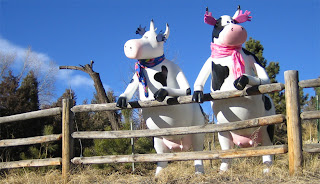 De Cris Lingle recibí este artículo de Dwight Lee. Está en inglés, pero explica cómo es que los motores de combustión interna, tan denostados por algunos que proponen “hacer algo” para evitar que se ensucie el ambiente, en realidad han contribuido efectivamente a que el ambiente sea más limpio.
De Cris Lingle recibí este artículo de Dwight Lee. Está en inglés, pero explica cómo es que los motores de combustión interna, tan denostados por algunos que proponen “hacer algo” para evitar que se ensucie el ambiente, en realidad han contribuido efectivamente a que el ambiente sea más limpio.
By Dwight R. Lee
The abuse heaped on the internal combustion engine by environmentalists was never justified. But a recent story on cow flatulence in the British newspaper, The Independent, makes the environmental benefits from gasoline-powered engines even more obvious. Based on a recent study by the Food and AgriculturalOrganization, The Independent reports that “livestock are responsible for 18 percent of the greenhouse gases that cause global warming, more than cars, planes and all other forms of transport put together.”
Long before global warming became an environmental concern, however, the move from the power provided by animals to that provided by gasoline had greatly improved the environment. The emissions that came out of the tailpipes of horses were much more lethal pollutants that those now coming out of the tailpipes of cars. Horse emissions did more than make our town and cities stink; they spread fly-borne diseases and polluted water supplies that killed people at a far greater rate than the pollution from cars and trucks ever have.
Photochemical smog is clearly a health risk, but not nearly the health risk of cholera, diphtheria and tetanus that have been largely eliminated with the help of gasoline powered transportation.
Before the internal combustion engine it wasn’t just cows, sheep and pigs emitting pollution down on the farm. Tractors and other types of gas-powered farm machinery eliminated the horses, mules and oxen that had provided most of the power necessary to grow and harvest our food and fiber. This not only reduced the problem that still exists from animal waste that environmentalists, with justification, still complain about. The internal combustion engine also eliminated the need to produce food to fuel millions upon millions of agricultural beasts of burden. It has been estimated that in 1900 it took about 93 million acres of land to grow the food for the farm animals that were replaced by current farm machinery. Most of that land has now gone back to woodlands, greatly increasing the number of trees that are reducing the problem of global warming by absorbing carbon dioxide.
The above consideration should have been enough to warrant an environmental shrine to the internal combustion engine. And now we find that by eliminating all those farm-yard animals, the internal combustion engine also eliminated vast amounts of methane-producing flatulence, which is a much more powerful greenhouse gas than the carbon dioxide produce by burning gasoline.
Even though the internal combustion engine is less polluting than what it replaced, it is obviously not pollution-free. Efforts should, and will be made to make it even less polluting than it is, and some day internal combustion will be replaced by an even less polluting technology. But history will look kindly on the internal combustion engine as a major contributor to the steady progress toward a healthier environment that has been made over the centuries.

